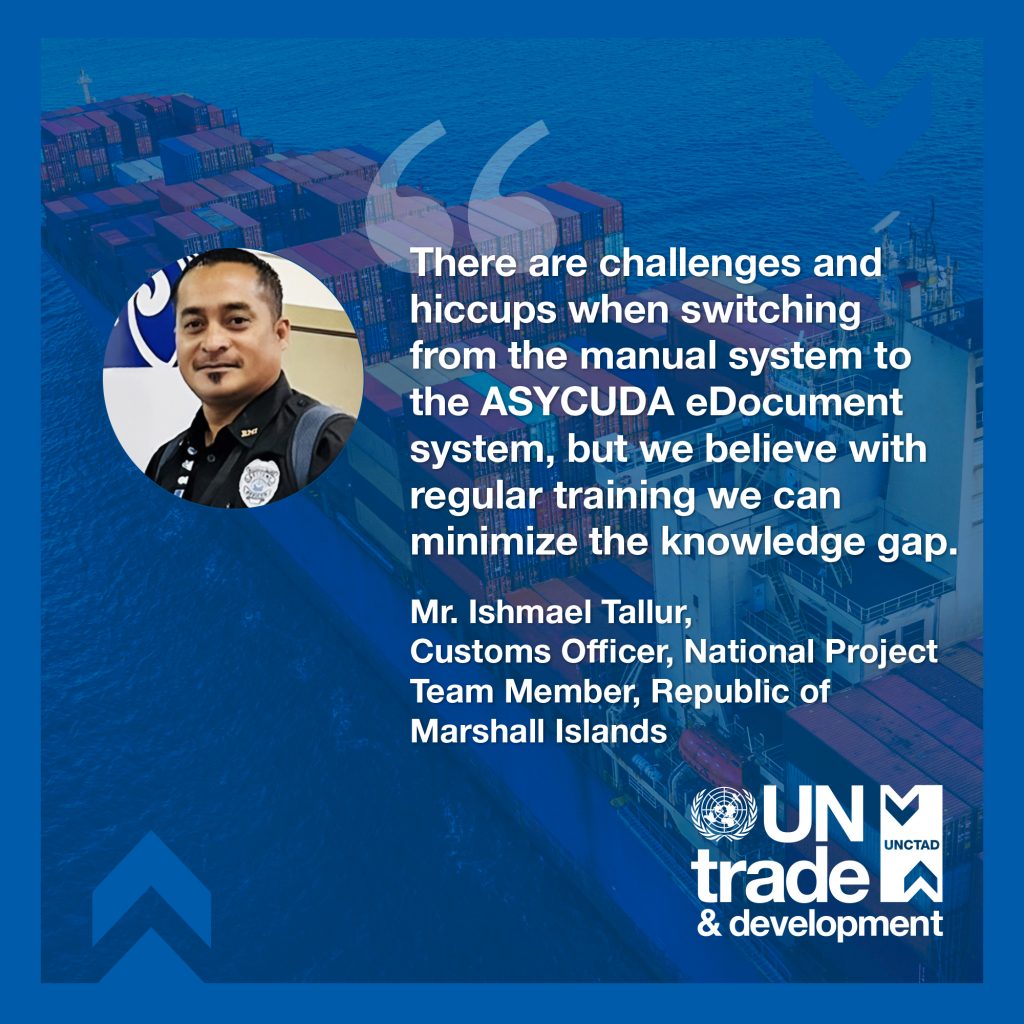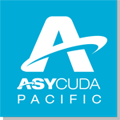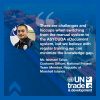In the Pacific, the United Nations Trade and Development (UNCTAD) backed ASYCUDA technologies have reached the shores of 14 countries enhancing their customs and trade capabilities.
The customs administration and the trading community have undergone digital transformation with the ASYCUDA technologies leaving behind manual processes.
Programmes such as ASYCUDAWorld and electronic Single Window have introduced efficiencies, transparency, reduced time and cost, improved government revenues and trade statistics, and support progress toward achieving sustainable development goals.
However, embracing digitalization is an ongoing process and comes with challenges, such as technical skills gaps and potential insecurity about workflow disruptions and cultural shifts.
To enable smoother transition and post implementation phase, ASYCUDA Pacific provides detailed training to customs officers and stakeholders before system launch. This proactive approach equips them with essential skills to navigate the automated system effectively, minimizing operational disruptions and maximizing efficiency.
By familiarizing the trading community with the technology beforehand, ASYCUDA facilitates seamless integration into customs operations, enhancing transparency, accuracy, and overall effectiveness in managing international trade transactions.
Ms. Niro had to immerse herself in understanding the complexities of the automated system, moving away from traditional paperwork.
With support from the European Union-funded Improving Pacific Islands Customs and Trade (IMPACT) project, the trading community of the Republic of Palau, the Federated States of Micronesia and the Republic of Marshall Islands were trained in the lead up to the implementation of the system.
Feedback from our trainings, boosting efficiency!
In the Republic of Marshall Islands, where the system is being finalized for launch, the UN Trade and Development, ASYCUDA Expert, Mr. Ravinda Warnakulage, said despite the technological challenges including power outages and outdated IT infrastructure, the trading community were provided with intense training until they were ready to use the system.
“Despite the challenges, the training continued and users were assisted on a timely basis and queries were attended to,” Mr. Warnakulage stated.
“Necessary training materials and declaration templates are published in the RMI ASYCUDA portal’s website for stakeholder use. The training lab is setup in the Customs premises and the stakeholders onsite, may visit to get help. Training for stakeholders is part of the schedule,” he added.
The Acting Chief of RMI Customs, Mr. Doug Anjain, mentioned, “We had to upgrade our ICT infrastructure to suit the ASYCUDA operation and recruited additional customs offices to strength the work force and constant training both internal and external stakeholders is a key factor to the successful implementation of ASYCUDA and the training sessions are being conducted.”
The RMI Customs Officer, National Project Team Member, Mr. Ishmael Tallur shared, “Two people including myself received the ASYCUDA functional training at ASMP office in Suva, Fiji, and we help to train internal staff and external stakeholders. There are challenges and hiccups when switching from the manual system to the ASYCUDA eDocument system, but we believe with regular training we can minimize the knowledge gap.”
The Director for the Republic of Palau’s Bureau of Customs and Border Protection, Mr. John Tarkong Jr. attributed the advance training ahead of the system launch in enabling efficient and seamless customs processes.
“Thanks to the ASYCUDA training, our officers are well acquainted with the system and its processes,” Mr. Tarkong Jr. said.
In the Federated States of Micronesia, where the system was launched in March 2024, an Agent at Transco Agencies, Ms. Maria Corazon James, remarked, “Training with the ASYCUDAWorld system was a good experience and meant learning more with computerizing stuffs.”
Another ASYCUDAWorld user who underwent the same training, Mr. Alvin Cholymay, emphasized, “The training was important to ensuring we, the users, were well acquainted with the system before using it daily.”
Mr. Cholymay, who is also an Agent at Transco Agencies, added that changing from manual to a digital platform was not easy as years of working in manual routine changed quickly.
“Without a comprehensive training, it would not have been possible to use the system, it comes with a lot of good things and being accurate is key to manning the digital system. And the good thing was that different trainings were held for different groups of users which made things easier to understand and grasp.” Mr. Cholymay noted.
While the functional trainings happen prior to the launch of the system, UNCTAD’s team of ASYCUDA experts remain available to help address any challenges experienced by the trading communities following implementation.
Timely trainings are also scheduled to keep users at pace and up to date with the system.

About ASYCUDAWorld: ASYCUDAWorld is a cutting-edge customs management system by UN Trade and Development, aimed at simplifying trade and customs processes.
About the IMPACT Project: Funded by the European Union, the IMPACT project seeks to enhance customs operations through technological advancements and capacity building.


